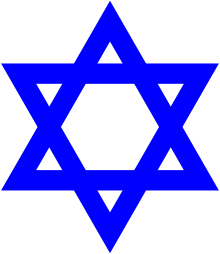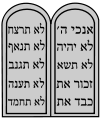Honorifics for the dead in Judaism
| Part of a series on |
| Judaism |
|---|
   |
|
Other religions
|
|
Related topics |
|
Among the honorifics in Judaism, there are several traditional honorifics for the dead which are used when naming and speaking of the deceased. Different honorifics might be applied depending on the particular status of the deceased. These honorifics are frequently found on gravestones, on memorial walls inside the sanctuary of synagogues, in speeches, and in writing such as in obituaries.
In writing, it is most common to use the name followed by an abbreviation of an honorific either in Hebrew or English. For examples, see chart.
Comparison chart
The following chart shows different honorifics used, along with their abbreviation in Hebrew and English, their translation, the masculine and feminine forms, the type of person which the honorific is applied to, and examples.
| English abbreviation |
Hebrew abbreviation |
Full phrase in Hebrew | English translation | When used | Example | |
|---|---|---|---|---|---|---|
| For a man | For a woman | |||||
| Z"L |
ז״ל[1] | זיכרונו לברכה zikhrono livrakha |
זיכרונה לברכה zikhronah livrakha |
of blessed memory; or may his/her memory be a blessing |
non-rabbinical figure |
David Randomberg Z"L or David Randomberg ז״ל |
| A"H | ע״ה[1] | עליו השלום alav ha-shalom |
עליה השלום aleha ha-shalom |
may peace be upon him/her | Joshua Randomstein A"H or Joshua Randomstein ע״ה | |
| ZT"L or ZTz"L |
זצ״ל | זכר צדיק לברכה zekher tzadik livrakha |
may the memory of the righteous be a blessing |
a holy or a righteous person |
Rabbi Moshe Feinstein ZT"L or Rabbi Moshe Feinstein ZTz"L or Rabbi Moshe Feinstein זצ״ל | |
| ZK"L | זק״ל | זכר קדוש לברכה zekher kadosh livrakha |
may the memory of the holy be a blessing |
righteous martyr (including those murdered by enemies of the Jews) |
Rabbi Avraham Yitzchak Bloch ZK"L or Rabbi Avraham Yitzchak Bloch זק״ל | |
| n/a | זצוקללה״ה | זכר צדיק וקדוש לברכה לחיי העולם הבא zekher tzadik v'kadosh livrakha, l'chayei ha'olam ha-ba |
may the memory of the righteous and holy be a blessing for the world to come |
select group of historical personages |
Avraham Avinu (may the memory of the righteous and holy be a blessing for the world to come) or Avraham Avinu זצוקללה״ה | |
| HY"D | הי״ד | השם ינקום דמו Hashem yinkom damo |
השם ינקום דמה Hashem yinkom dama |
May Hashem avenge his / her blood | Martyred Jews or Jews killed by anti-Semites | Hana "Hanička" Bradyová HY"D or Hana "Hanička" Bradyová הי״ד |
General honorifics
Some honorifics may be used for any individual. These honorifics are generally not used for rabbis or other special persons, since the specific honorifics for those people are used instead, as a sign of honor and respect. See below.
Of blessed memory
The most common honorific is "of blessed memory,"[2] and the Hebrew transliteration is "zikhrono livrakha" (m.) / "zikhronah livrakha" (f.) (Hebrew: (f.) "זיכרונה לברכה" \ (m.) "זיכרונו לברכה"). It is often abbreviated in English both as OBM and as “Z"L” The Hebrew abbreviation is "ז״ל."
Peace be upon him/her
An alternative honorific is "Peace be upon him/her." The Hebrew version is "alav ha-shalom" (m.) / "aleha ha-shalom" (f.) (Hebrew: (m.) "עליו השלום" / (f.) "עליה השלום"). It is abbreviated in English as “A"H.” The Hebrew abbreviation is "ע״ה."
This phrase is the same as the Islamic honorific "peace be upon him" (which is used for all prophets of Islam). However, unlike in Islamic usage, the English abbreviation "PBUH" is not commonly used for the Jewish honorific.
The above two may be used interchangeably; however "of blessed memory" is the most common.
May Hashem avenge his/her blood
This honorific "May Hashem avenge his/her blood" is used for a non-rabbinic general individual who perished as a result of anti-semitism, for example pogroms or the Holocaust. The Hebrew version is "Hashem yinkom damo" (m.) / "Hashem yinkom dama" (f.) and in the Hebrew: (f.) "ינקום דמה" \ (m.) "השם ינקום דמו." The English abbreviation is “HY"D” and in Hebrew "הי״ד."
Holy and the righteous
The abbreviation “זי״ע/zy"a” stands for "zekhuto yagen `aleinu/May his merit shield us," and often follows the mention of meritorious righteous ones. A variant is “זיע״א/zya"a” which adds "Amen" at the end.
Memory of the righteous
The honorific "May the memory of the righteous be a blessing" is used after the names of holy rabbis and other holy people, from Proverbs 10:7. In Hebrew transliteration: "zekher tzadik livrakha" and in Hebrew: "זכר צדיק לברכה." The English abbreviation commonly used is “ZT"L” and in Hebrew, "זצ״ל" is used. It is pronounced in reading as "zatzal." It may be also written as “ZTz"L”.
It is used primarily in reference to rabbis who have been deceased in recent memory. Thus, one is likely to write “Rabbi Moshe Feinstein ZT"L” (d. 1986) but far less likely to write “Rabbi Shneur Zalman of Liadi ZT"L” (d. 1812).
Memory of the holy martyrs
"May the memory of the holy be a blessing" is used specifically for holy martyrs and those killed in times of persecution, for example, in the Holocaust. In Hebrew transliteration "zekher kadosh l'vrakhah" and in Hebrew "זכר קדוש לברכה." It may be abbreviated as “ZK"L” or in Hebrew "זק״ל."